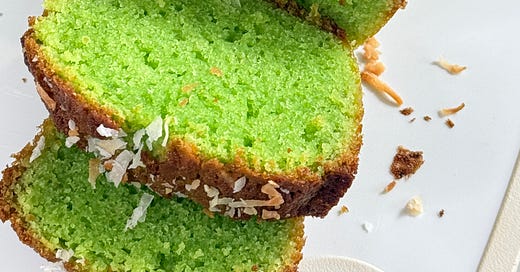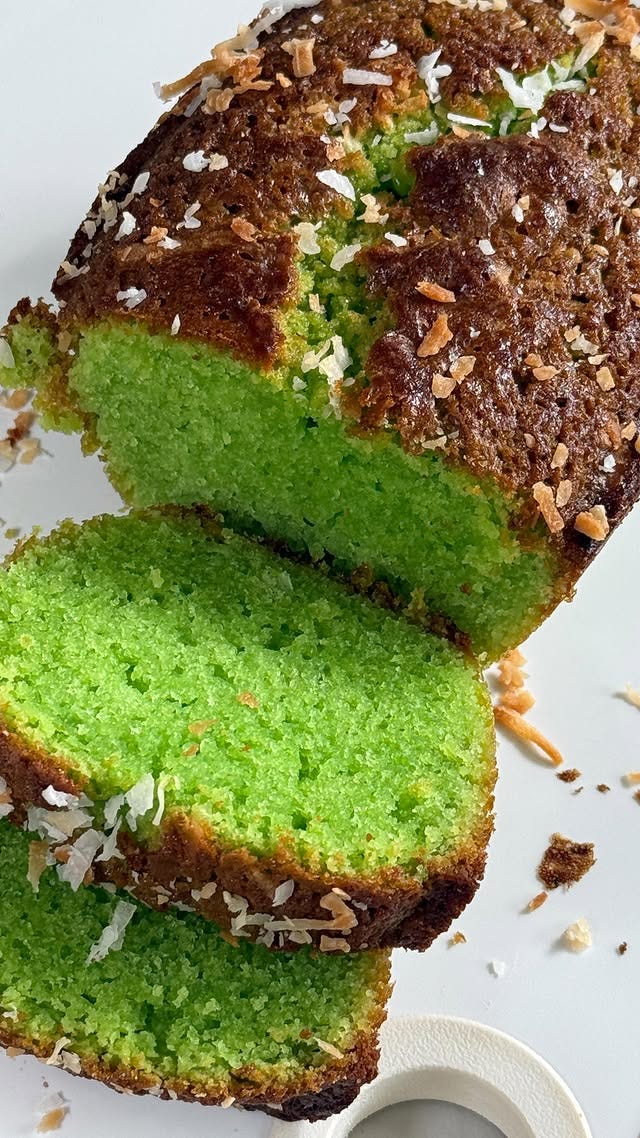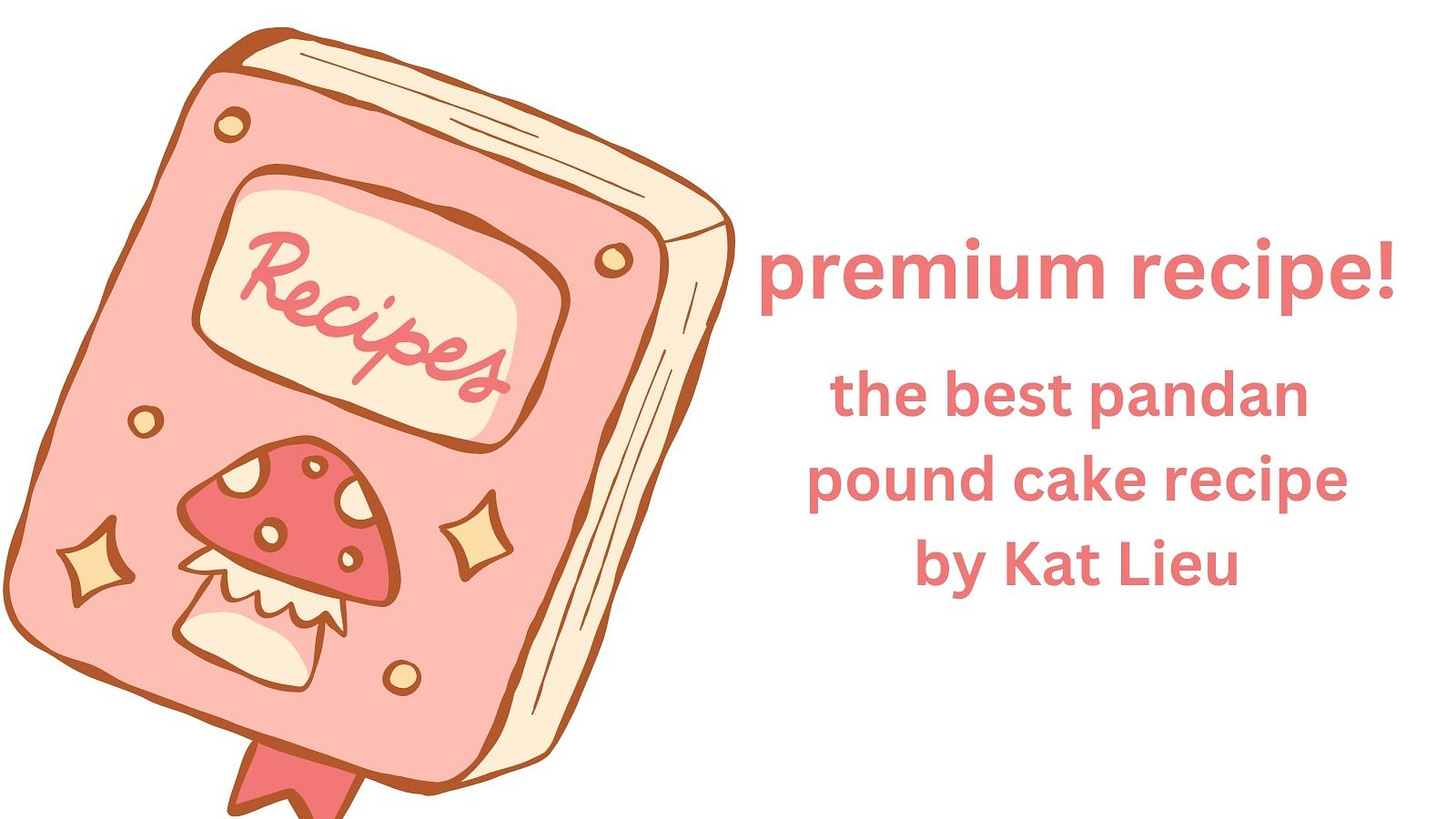life is hard, that's a given, but you can make it better with pandan pound cake
reflections on the human experience and a yummy recipe
ANNOUNCEMENT!
my dear friend, my next cookbook, 108 Asian Cookies, is coming this October, and if you preorder now, you will receive a year-long subscription to my premium substack (worth $70) and access to new recipes all year long! Preorders mean so, so much to underrepresented authors like me and show publishers and retailers that voices like mine deserve prominent spaces on the bookshelves!
Thank you!
END OF ANNOUNCEMENT
dear friend,
one of my closest friends is Cantonese American, like me, and I’ve realized that, throughout our 7+ years of friendship, we have never had a heartfelt conversation together. I guess that’s the Cantonese way. We just don’t talk about our emotions and struggles.
One reason is because we’ve learned to keep things so deeply inside of us that we don’t even know how to properly express our feelings without big reactions. When when one of us cracks, it’s extreme. It’s almost violent. We spiral.
My Cantonese-Vietnamese father had an explosive temper. My Cantonese mother had too much of a savior complex.
And we’re so good at dissociating. So many of us are glued to the screen watching K-dramas or C-dramas. Me, I hide in my kitchen to cook and bake, or I’d play videogames. I especially love playing as white male characters with power.
And I, well, let’s just say it took me almost 40 years to learn how to express myself and regulate my emotions. I’m still learning, but I’m better at it these days.
Back to my friend. She kept yawning all night and saying how tired she was. It felt to me like she was tired of her current routine. I could tell she’s been struggling both at work and home. Shortly after dinner, she blurted out, “Life’s so hard.” Her tears were on the verge of spilling.
Our husbands chatted in the background, their conversation jovial and light. Neither mine nor hers knew my friend, and I were having a quiet sobfest, one where we didn’t actually sob, but you can hear and feel all of our pain. There were tears tho, ones we tried so hard to hide and suck back into our eye sockets.
After the night ended, our husbands were still clueless. They did wonder why our conversation was lasting so long.
My friend wiped away her tears and ended our conversation, stating, “I’ll be better soon when the sun is out again.” In effect, she dismissed that her feelings were adequate and blamed the weather instead of the underlying issues causing her stress and pain.
The truth is, life is hard. It wouldn't be real if everything fell perfectly into place. We're not living in some flawless simulation. We're meant to cry, to stumble, to feel the weight of stress and hardship. And yet, it's those very struggles that make our victories feel like triumphs, our happy days shine even brighter.
We aren't meant to be perfect, but in our imperfections, we find growth, connection, and a deeper appreciation for the moments that truly matter. And maybe, just maybe, it’s in the silence of unsaid words where we start to learn how to heal.
Talking about her struggles and opening up to me was a step toward healing. After I went home, I texted my friend, telling her how much I loved her and that we should go do yoga or hang out together.
She did not respond. And I understood.
Growing up with unwarm, ungentle Cantonese mothers, we were never taught to express love in the ways that others might. Affection was often hidden behind acts of care. Our mothers excelled at performing acts of service: feeding us, taking care of our needs. But words of affirmation, the warmth of physical touch, and those three words of“I love you” were never spoken aloud, not in English, not in Cantonese.
It’s hard to give what you didn’t receive. And even harder to feel it when you’ve never had it modeled for you. Me modeling expressions of love and understanding felt so foreign to my friend. I don’t foresee her opening up to me any time soon again.
So I guess we will carry our love in silence, her continuing to hide behind the walls she’s built over the years. Slowly, perhaps I can crack the walls, with gifts of my baking, which I often send over to their house, with tiny hugs, with compliments, and just by being there for her.
With my baked goodies, they’re a small gesture, a way of offering something tangible—something sweet, well not too sweet—that speaks louder than words sometimes.
But, deep down, I know it’s not just about the cakes or cookies; it's about showing her I see her. That I care, even if I can’t break down all the barriers in one conversation.
What’s harder is realizing how often we, as Asian Americans, avoid the things that could help us heal. Therapy, for instance, is something we shy away from. It’s like a taboo. A 2020 study by the American Psychological Association showed that 60% of Asian Americans reported feeling stigma around seeking mental health support. Therapy feels “too expensive,” “too shameful,” or “not for us.”
We deflect. Instead of talking about our emotions, we stuff them down or bury ourselves in work, in school, in taking care of others. We dissociate. And even if we do seek help, we often go for a quick fix, thinking it'll go away on its own, because, really, what’s the point of talking about it if we can’t even say it out loud without feeling weak or judged?
This silence, this avoidance, is part of the story we carry. It's ingrained in our cultural fabric, where struggles are internalized, swept under the rug, or dismissed as something we should be tough enough to handle on our own.
As a child, when I cried or was sad, I always did it alone, hidden in my bedroom with the doors closed.
*trigger warning: suicide*
My parents never knew of the times I thought about killing myself and slitting my wrists when I was a teenager. Sometimes, that hurt inner child tells me to jump when I look down from high spaces.
My father passed away before he learned about any of this, and I would never break my mother’s heart now and tell her of my teenage struggles.
And maybe that’s part of the reason I don’t hear from my friend after I reached out. It’s not that she doesn’t appreciate me or my care; it’s that she’s not yet ready to break that cycle. I wasn’t ready for a while. I’m not fully ready myself, honestly.
To admit that maybe she doesn’t have to handle everything on her own. To admit that there are people here for her. That it’s okay to be vulnerable. It’s okay to fail and have a messy home.
As for me, I won’t keep showing up for her in the ways I know how, quietly, patiently, without expectation.
Because, one day, maybe she’ll be ready to talk again. And when that day comes, I’ll be here. Just like you and I are still learning to be there for ourselves.
Today, as a part of me healing and nurturing my inner child, I baked a beautiful pandan pound cake. I shared two slices, packing them for my mother and her friend on their daily walk. I saved a slice for my friend. And one for my beloved son. If you come for tea time, I’d save a slice for you too. But, before then, here’s the recipe, my dear friend, so you can have delicious pandan pound cake whenever you need a little sweetness in your life. Just like the love we sometimes struggle to express, may this cake bring a quiet comfort, a reminder that I’m here, always.
with so much love,
xoxoxo,
Kat Lieu
Keep reading with a 7-day free trial
Subscribe to Kathleen's Kitchen to keep reading this post and get 7 days of free access to the full post archives.








